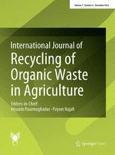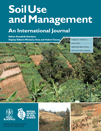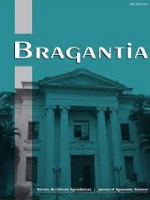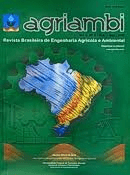
International Journal Of Recycling of Organic Waste in Agriculture
Scope & Guideline
Cultivating Sustainability: Where Waste Meets Wisdom
Introduction
Aims and Scopes
- Organic Waste Management Techniques:
Research on various techniques for managing organic wastes, including composting, vermicomposting, and anaerobic digestion, aimed at enhancing waste recycling and utilization in agriculture. - Soil Health and Fertility Enhancement:
Studies that investigate how organic amendments from waste contribute to improving soil properties, fertility, and microbial activity, ultimately leading to better crop yields. - Crop Production and Nutrient Management:
Exploration of the impact of different organic wastes on crop growth, nutrient uptake, and productivity, including the use of bio-fertilizers and organic amendments. - Sustainable Agricultural Practices:
Research promoting sustainable agriculture through the recycling of organic waste, addressing environmental concerns and resource efficiency. - Innovative Waste Valorization Strategies:
Development and assessment of novel methods to valorize organic wastes, such as using biostimulants, biochar, and specific microbial inoculants to enhance agricultural outcomes.
Trending and Emerging
- Bioconversion and Microbial Applications:
There is a growing focus on the use of specific microorganisms for the bioconversion of organic wastes, highlighting the potential of microbial technologies to enhance waste recycling efficiency. - Integration of Organic Waste with Biostimulants:
Recent publications emphasize the synergistic effects of combining organic waste with biostimulants, showcasing new strategies for improving plant growth and soil health. - Circular Economy in Agriculture:
The theme of circular economy is emerging, with research focusing on how organic waste recycling can contribute to sustainable agricultural practices and resource efficiency. - Impact of Organic Amendments on Climate Resilience:
Studies are increasingly examining how organic waste recycling can enhance soil resilience to climate change effects, such as drought and soil degradation. - Advanced Waste Processing Techniques:
Innovative approaches such as using black soldier fly larvae, biochar production, and tailored composting methods are gaining traction as effective strategies for organic waste recycling.
Declining or Waning
- Chemical Fertilizer Comparisons:
Research comparing the effects of organic amendments versus chemical fertilizers is becoming less frequent, as the focus shifts towards purely organic and sustainable practices. - Traditional Waste Recycling Methods:
The exploration of conventional methods of organic waste recycling, such as simple composting without innovative approaches or technologies, is declining in favor of more advanced techniques. - Generalized Waste Characterization:
Studies that provide broad characterizations of organic wastes without specific applications or outcomes are less common, as the journal emphasizes more targeted research with practical implications.
Similar Journals

Journal of Soil Science and Plant Nutrition
Innovating research for a greener, healthier planet.The Journal of Soil Science and Plant Nutrition, published by SPRINGER INT PUBL AG, is a premier academic journal dedicated to advancing the fields of agronomy, plant science, and soil science. With an impressive Q1 ranking in both Agronomy and Crop Science and Plant Science, alongside a Q2 ranking in Soil Science, this journal stands at the forefront of innovative research and knowledge dissemination. Annually indexed in key databases, it provides a platform for high-quality research articles that explore the complex interactions between soil health and plant nutrition, contributing significantly to sustainable agricultural practices. Although it does not offer open access options, the journal is accessible through various academic institutions and libraries, ensuring a wide readership. With its emphasis on impactful findings, the journal is an essential resource for researchers, professionals, and students aiming to further their understanding and application of soil and plant science in an ever-evolving global context.

Malaysian Journal of Soil Science
Cultivating Knowledge, Enriching Soil Science.The Malaysian Journal of Soil Science, published by the Malaysian Society of Soil Science, serves as a vital platform for disseminating high-quality research in the fields of Agronomy and Crop Science as well as Soil Science. With an ISSN of 1394-7990, this peer-reviewed journal has made significant strides since its establishment in 2009, currently positioned in the Q2 quartile for both categories as of 2023. The journal aims to advance knowledge surrounding soil health and management practices, particularly within the Malaysian context, while also addressing global soil science issues. Despite being based in Malaysia, it welcomes contributions from a diverse range of geographies and viewpoints, enriching the academic discourse. Researchers and practitioners in this field will find a wealth of innovative studies and findings that reflect the current trends and challenges in soil management. Given its current rankings in Scopus, the journal plays a crucial role in shaping the future of soil science, making it indispensable for anyone dedicated to advancing research and practical applications in agricultural and environmental sciences.

SOIL USE AND MANAGEMENT
Connecting research to practice in soil management.SOIL USE AND MANAGEMENT is a premier academic journal published by Wiley, focusing on the critical domains of Agronomy, Crop Science, Pollution, and Soil Science. With an ISSN of 0266-0032 and an E-ISSN of 1475-2743, the journal has established itself as a vital resource in the field since its inception in 1985. Operating from its U.S. headquarters in Hoboken, NJ, SOIL USE AND MANAGEMENT boasts impressive Q1 rankings across its relevant categories, indicating its standing in the top tier of research journals. Notably, it is ranked 48th out of 406 journals in Agronomy and Crop Science and holds an 88th percentile position, as well as a commendable rank of 26th out of 159 journals in Soil Science, underscoring its influence and reach. This journal serves as an essential platform for researchers, professionals, and students dedicated to sustainable soil management practices and understanding soil's role in agricultural productivity and environmental health. Although it does not offer Open Access, its rigorous peer-review process ensures the publication of high-quality original research, reviews, and case studies critical for advancing knowledge and practice in the field. This journal is crucial for anyone engaged in soil science and its related disciplines, encouraging innovative approaches to challenges facing soil use and management today.

Biochar
Fostering Collaborative Research for Sustainable Soil SolutionsWelcome to Biochar, an esteemed academic journal dedicated to the exploration and advancement of biochar technology and its applications across multiple fields. Published by SPRINGER SINGAPORE PTE LTD, this journal serves as a vital platform for disseminating high-quality research that addresses the critical intersection of environmental science, soil health, and sustainable materials development. With a commendable Q1 ranking in the fields of Biomaterials, Environmental Science, Pollution, and Soil Science, Biochar is recognized for its significant impact, as evidenced by its placement in the upper percentiles across various Scopus rankings. Researchers and professionals in agricultural and biological sciences will find valuable insights and innovative methodologies that promote sustainable practices and enhance soil quality. This journal, operating from its base in Germany, is committed to fostering a collaborative environment where cutting-edge research can inform policy and practice. Engage with us as we strive to advance the science of biochar from 2019 to 2024 and beyond.

BRAGANTIA
Connecting Research to Real-World ImpactBRAGANTIA, published by the Instituto Agronômico, is a distinguished open access journal that has been a vital resource since its inception in 1977. With an ISSN of 0006-8705 and E-ISSN 1678-4499, this journal is recognized for its contributions to the field of Agricultural and Biological Sciences, where it currently holds a respectable Q2 ranking as of 2023. Additionally, BRAGANTIA is indexed in various databases, supporting its impact within Materials Science (Q3 ranking). Positioned in Brazil, the journal promotes the dissemination of high-quality research, aiming to bridge the gap between academia and practical applications in agricultural innovation and sustainability. Researchers, professionals, and students looking to keep abreast of recent advancements and their implications will find BRAGANTIA to be an indispensable platform for sharing and accessing vital agricultural knowledge.

PLANT SOIL AND ENVIRONMENT
Connecting Soil Health to Ecosystem Prosperity.PLANT SOIL AND ENVIRONMENT is a premier open-access journal dedicated to the interdisciplinary study of soil science, agronomy, and environmental interactions, published by the Czech Academy Agricultural Sciences. With an ISSN of 1214-1178 and E-ISSN 1805-9368, this journal has been a vital platform for dissemination of research since its inception in 2002. Based in the Czech Republic, it has garnered a robust reputation within its field, as indicated by its impressive Q2 ranking in Soil Science and ranking #47 out of 159 in the Scopus Ranks for Agricultural and Biological Sciences, placing it in the 70th percentile overall. The journal explores diverse topics within soils and their significant roles in plant health, ecosystem services, and sustainable agricultural practices, contributing important insights that benefit researchers, practitioners, and policy-makers alike. Aiming for a global outreach, PLANT SOIL AND ENVIRONMENT not only facilitates open dialogue among scientists but also ensures that cutting-edge research is freely accessible to enhance the knowledge base in soil science.

Revista Brasileira de Engenharia Agricola e Ambiental
Connecting Researchers for a Sustainable Future in AgricultureRevista Brasileira de Engenharia Agricola e Ambiental, published by the Universidade Federal de Campina Grande, serves as a pivotal platform for researchers and professionals in the fields of agricultural and biological sciences, agronomy, and environmental engineering. With an open-access policy since 2000, this journal aims to foster global dissemination of innovative research and practices, ensuring that high-quality findings are accessible to all. Operating in Brazil, it holds notable rankings, including Q2 in the categories of Agricultural and Biological Sciences (miscellaneous) and Agronomy and Crop Science, indicating its strong academic impact and influence within these fields. As of 2023, it ranks #68 out of 193 in Agricultural and Biological Sciences and #188 out of 406 in Agronomy and Crop Science, representing its commitment to advancing scientific knowledge. The journal primarily focuses on publishing studies that address challenges in agricultural engineering and environmental sustainability, making it an essential read for students, researchers, and professionals who are dedicated to innovation and excellence in these dynamic fields.

International Journal of Plant Production
Empowering global food security with cutting-edge plant science.International Journal of Plant Production, published by SPRINGER in Switzerland, serves as a leading platform for the dissemination of innovative research in the fields of Agronomy, Crop Science, and Plant Science. With an ISSN of 1735-6814 and an E-ISSN of 1735-8043, this journal has maintained its reputation by achieving a Q2 quartile ranking in both categories as of 2023, alongside notable Scopus rankings placing it in the top quartiles of its fields (Rank #105/516 and Rank #88/406, respectively). The journal's scope encompasses a wide array of topics vital to sustainable agriculture and plant production systems, making it a critical resource for researchers, professionals, and students striving for advancements in these disciplines. By fostering open scientific dialogue and supporting cutting-edge research, the International Journal of Plant Production is committed to contributing to the resolution of global food security challenges, enhancing agricultural practices, and promoting ecological sustainability.

Waste Management
Exploring cutting-edge methodologies in waste management.Waste Management, published by Pergamon-Elsevier Science Ltd, stands as a premier journal in the field of waste management and disposal, reflecting its esteemed position with an impressive 2023 impact factor and ranking in the Q1 category. This journal is pivotal for researchers, professionals, and students, offering a rich repository of innovative studies and methodologies aimed at addressing the increasingly critical challenges in waste management. With a dedicated focus on advancing knowledge and practice in environmental science, it encompasses a wide array of topics from waste reduction techniques to sustainable disposal strategies. Founded in 1983, Waste Management continues to be at the forefront of academic discourse, providing invaluable insights into both theoretical frameworks and practical applications, thus playing a vital role in shaping the future of waste disposal practices worldwide.

Transactions of the ASABE
Empowering engineers to tackle global agricultural challenges.Transactions of the ASABE is a premier journal published by the American Society of Agricultural and Biological Engineers, specializing in innovative research and practical applications in the fields of agricultural and biological engineering. With an ISSN of 2151-0032 and E-ISSN 2151-0040, this journal has established a vital niche in disseminating high-quality scholarly content that addresses the complex challenges faced in agriculture and biological systems. The journal operates under an open access model, facilitating broad dissemination of research findings to a global audience. This commitment to accessibility is reflected in its coverage of diverse topics, including agriculture, soil science, food science, and environmental engineering. Although the journal's coverage in Scopus was discontinued in 2021, it once ranked among the top in its categories, indicating its significant contribution to advancing knowledge in these essential fields. Researchers, practitioners, and students are encouraged to engage with the Transactions of the ASABE to stay abreast of developments and foster collaboration in promoting sustainable engineering solutions.